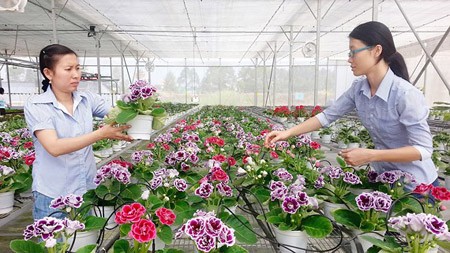
The production value per hectare was able to reach VND502 million (approx. $21,638) last year, a growth of 11.5 percent compared to this time the year before. The general agriculture development rate of HCMC was twice as fast as the national one, with the Gross Regional Domestic Product increasing by 6.2 percent.
Expansion of 4 main projects
Recently, various new agricultural models that implement cutting edge technologies, particularly biotechnology and information technology, have achieved spectacular results. Take for example the Mokara Greenhouse for tropical flowers in Cu Chi District, the hi-tech melon farm in Hoc Mon District, the hi-tech shrimp ponds in Can Gio District, the dairy farm in Cu Chi District. They are all eminently suitable for urban agriculture development.
Appreciating these updated models, Standing Vice Chairman of the HCMC People’s Committee Le Thanh Liem has encouraged the implementation of information technology into agricultural manufacturing in the hope for the city to possess a high-tech agriculture area.
HCMC is also exercising various advantageous policies for businesses and individuals to invest in these models. In 2016, the HCMC People’s Committee issued Decision No. 6150/QD-UBND for the program ‘Developing Agriculture via the Use of High Technologies in HCMC from 2016 – 2020, with Orientation to 2025’.
Thanks to all these efforts, in 2018, HCMC owned 407ha surface area of hi-tech farms in various districts such as Cu Chi, Hoc Mon, Binh Chanh, Nha Be, and Can Gio, an increase of 4.8 percent compared to this time in 2017 (with only 389ha).
Besides the land growth, many new models have been formed in the suburban areas like hydroponics vegetable, melon, or bell pepper farms using drip irrigation and substrates in plastic greenhouses. The rate of hi-tech application in agriculture in the period from 2015 – 2020 has been quite impressive, rocketing from 10 percent in 2010 to 35.8 percent in 2016 and then 38.2 percent in 2018.
The city is planning to continue carrying out its 4 major projects of expanding the 200-hectare hi-tech agricultural area in Pham Van Coi Commune of Cu Chi District, constructing a new hi-tech aquaculture area in Can Gio District, enlarging the 23-hectare hi-tech agricultural area in Phuoc Vinh An Commune of Cu Chi District, and building a hi-tech breeding farm in Binh Chanh District.
Human resources training for high tech
To meet the upcoming urgent demands in human resources, it is necessary to organize training sessions, make technology transfers related to urban agriculture.
According to Mr. Nguyen Phuoc Trung, Director of the HCMC Department of Agriculture and Rural Development, there are now 31 biotechnology startup businesses participating in the incubation centers and 600 companies as well as co-operatives taking part in training classes to improve their trade capacity, brand name building, management ability in agricultural manufacturing.
Related agencies of the government are also holding workshops for 600 rural workers and 80 officers regarding dairy farming, shrimp farming, and decoration flowers using advanced technologies. In addition, 13 officers have been sent to training courses in Japan, South Korea, China, Taiwan for high tech applications in agriculture.
Various local short-term classes in the country have also been organized for technicians to obtain cutting edge knowledge about disease diagnosis for plants using molecular biology, genetic engineering in selecting mushroom types, milk cow quality improvement, plant seed selection using biotechnology, melon growing, hydroponics in vegetable growing, nutrition monitoring in raising milk cows, hi-tech growing techniques for orchid growing.
There have been 243 local workshops to help transfer new technologies to farmers in suburban areas, along with the publication of handbooks, flyers, and guiding CDs to popularize necessary new knowledge to the public.
According to Dr. Duong Hoa Xo, Deputy Director of the HCMC Department of Agriculture and Rural Development cum Director of the HCMC Biotechnology Center, it is essential that educational institutes cooperate with other agencies to prepare suitable training programs for both farmers and agriculture businesses to reach the most promising outcome for the urban agriculture of the city.
























